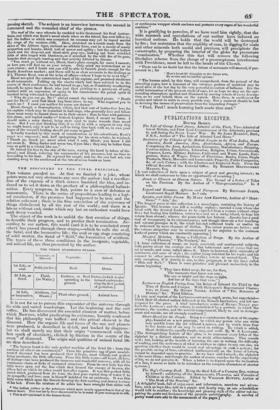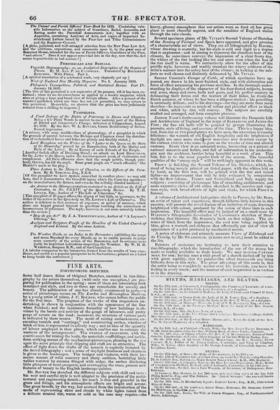PUBLICATIONS RECEIVED.
BotiND boons.
The Life of George Lord Anson, Admiral of the Fleet, Vice-Admiral of Great Britain, and First Lord Commissioner of the Admiralty previous to and during. the Seven Years' War, By Sir JOHN BARROW, Bart., F. R.S., Author of " The Life of Admind Lord Howe."
Statistics of the Colonies of the British Empire in the Wilt Indies, South America, North America, Asia, Australasia, Africa, and Burry's. Comprising the Area, Agriculture, Commerce,. 111anufactures, Custom-duties, Population, Education, Religion, Crime, Government, Finances, Laws, Military Detimce, Cultivated and Waste Lands, Emi- moution, Rates of Wages, Prices of Provisions, Banks, Coins, Staple Products, Stock, Moveable and Immoveable Property, Public Companies, &c. of each Colony ; with the Charters and Engraved Seals. From the Records of the Colonial Office, By Roamer MONTGOMERY MARTIN, Ehal. [A vast collection of facts upon a subject of great and growing interest; to which we shall endeavour to take an opportunity of recurrutg.] Janet, or Glances at Human Nature, The Second of a Series of Tales on the Passions. By the Author of " Misrepresentation." In 3 vole.
Legend and Romance, African and European. By RICTIARD JOHNS, Lieutenant Royal Marines. In 3 vols.
Ignatia, and Other l'oems. By MARY ANN Bnowivr, Author of " Mont- Wane," " Ada," &c.
[The longest poem in this collection is a monologue, narrating the history of !patio. This heroine was left a wealthy orphan ; married it man whom she loved with the devoted fondness to he expected from a woman without other ties ; but finding him faithless, retires to a seat on a rocky island, to hope his return from abroad; whence she pours forth her history. .Ignatia has a good deal of incougruity in its circumstances ; and though there are a few touching and natural passages in it, the whole has not sufficient truth or matter to be redeemed by mere elegance of diction. Time minor poems are better ; and the volume altogether may be recommended as far superior to the common batiks of poetry which are constantly appearing.] Minstrel Melodies. Beim, a Collection of Songs. By the Author of " Field Flowers,' '"'1' The'Garland," So% [A large collection of songs, Olt loyal, convivial, and sentimental subjects, with poetry about the average run of the bettentiost sort cd' verses that are set to tousle, anti some rather above it. There is, however, lit tie originality of sentiment, and Mlle of style ; the author being indebted for his tomes and his manner to other poets—drinking Castalids waters at second-hand. The only exception, if it strictly is one, to this judgment, is in the lines called " Hide and Seek." There IS some plaintive and pleasmutt melancholy in the stanza beginning 0 They have faded away, for Inc, for thee,
The moments that know not care ;
The eye so bright and the steps so light,
Are but of the days that were.")
Lectures on English Poetry, from the Reign of Edward. the Third to the Time of Burns and Cowper. With Slmkspere's Supernatund Chum, tens ; an Essay. By HENRY NEELE, Author of " The Romance of History," &c. Third Edition. [A very neat reprint of the Lectures—extensive, rapid, acute, but superficial— which their ill-starred author delivered at the Russell Institution, mud left un- prepared for the press. A brief introductory 'voice of 111:Nav NEELE pre- floes the Lectiti es ; and the volume is embellished by a portrait, in which the attorney, the versifier, and the morbid temperament, likely to end in derange- ment and suicide, are all strongly combined.]
Short-Handfhr the People. Being a compyeltensive System of Stenogra-
phy, founded on a new principle, by wholl any person who can write
may quickly leant the art without a mash.r, :Lull by which from four tip live hours out of six may be saved in writing. Fo Ivhich is :Oiled,
Sloe Arithmetic, equally ennple, easy, and swift. By W. S. LEONARD. [The distinguishing feature of this plan, is to represent every letter of the alphabet by a distinct character, awl to avoid abbreviations. This sounds well ; but, looking at the trouble of learning, the care in writing, the difficulty' of reading, and the uselessness of what is written in cipher to any one else, we question whether there would he inlieli real advantage in smolt a system ; for the possible saving of time, calculated mathematically on the forms of letters, cannot be depended upon in practice. As we have said formerly, tlte alphabet is the Mail) thing; and though the author of course vouches for the superiority of his, we do not perceive it. When a letter is to depend upon the inclination of a line, it SCUM as liable to be mistaken as the complex characters of shorter systems.] The Boy's Country-Book. Being the Real Life of a Country Boy, written by himself; exhibiting all the Amusements, Pleasures, and Pursuits of Children in the Country. Edited by WILLtast 110WITT, Author of " The Book of the Seasons," &c.
[A delightful book, full of enjoyment and information, anecdote and adven- ture, such as hays like, told in a simple and hearty way, as one schoolfellow would talk to another the knowledge and pleasing style of the editor not ina- pairing the gusto and freshness of the juvenile autobiography. A .number of pretty wkal-euti.atid to the amusement of the pages.] The Unions' and Parish Officers' Year-Book for 1839. Containing valu- able Information on the subject of Guardians, Relief, Accounts, and Rating under the • Parochial Assessments Act ; together with an Appendix, containing Analyses of Acts, and copies of important In- structional Letters issued by the Poor-law and 'Tithe Commissioners and the Registrar-General. [A plain, judicious, and well-arranged selection from the New Poor Law Act, and the additions, expositions, and comments upon it, by the great men of Somerset House, intended for the use of Parish Officers, Guardians of the Poor, "and others." Does it not appear somewhat late in the day, now that the Act seems impracticable in bad seasons
PERIODICALS AND SERIALS.
Vegetable Organography ; or, an Analytical Description of the Organs of Plants. By M. AUG. P. DE CANDOLLE. Translated by Bouoirros KINGDON. With Plates. Part 1.
[A spirited translation of a celebrated work, very elegantly got up.] West of England New Monthly Magazine. No. I. January 1839.
Philogene's Cosmopolitan, Political, and Statistical Review. Part IV. January 12,1839. [The title of this periodical is not expressive of its purpose till it has been ex- amined ; when we see its correctness as applied to a weekly magazine which aims at giving a large and broad view of foreign affairs. After a perusal of the numbers published, which our time has not yet permitted, we may return to this periodical. Meanwhile, we • observe that the price has been judiciously reduced from a shilling to sixpence.]
PAMPHLETS.
A Final DiAnce of the Rights of Patronage in Deans and Chapters. Being a few Plain Words in answer to one material part of the Bishop of Bristol and Gloucester's Charge, delivered at Chippeuhrun, August 30,1838. By the Rev. W. L. Bows, Canon Besidentiary of Sarum. Second impression. [A reissue, with some modifications of phraseology, of a pamphlet in which the grounds of quarrel between the Bishops and Chapters about the distribu- tion of ecclesiastical loaves and fishes are plainly and forcibly stated.]
Lord Brougham not the Writer of the "Letter to the Queen on the State
of the Monarchy," proved by an Examination both of the Matter and Style of the Letter. By an Enemy of such Friends of the People. [Another foolish affair of Downing Street ; an attack on Lord BROUGHAM, for the Letter to the Queen, under the too transparent mask of vindication and compliment. All these effusions show that the rough pebble, though care- lessly thrown, has hit the mark. Some great people are " much offended," like Hamlet's uncle at the play.] Three Letters to the Marquis of Chandos, on the Effects of the Corn- laws. By IL TORRENS, Esq., [Of this pamphlet we have spoken somewhat in another place: we may add here, that it demonstrates the threefold injury which the Corn-tax operates— on the manufacturer, the farmer, and even on the selfishly-blinded landlord.]
An Answer to the _Misrepresentations contained in an Article on the Life of
Clarendon, in No. CXXIV. of the Quarterly Review. By U. LISTER, Esq, Author of "The Life of Clarendon," &c. [This pamphlet of 40 pages affixes the stigma of bad faith, or ignorance, to the writer of the review in the Quarterly on Mr. LisTen's Life of Clarendm. The author is deficient in that neatness of exposure, or power of sarcasm, which alone can impart general interest to questions touching the correctness or incorrectness of' references. The reply, however, is not more minutely tedious than the review.] "How do you dog" By J. A. TnonNTnwarrii, Author of "A Layman's Offering," &c.
Analyses and Scripture Proofs of the Homilies of' the United Church of Englund and Ireland. By the same Author.
The Weather Guide, or an Index to the Barometer ; exhibiting the range and mean Standard for every Month, so as to enable persons to judge more correctly of the action of the Barometer, and to esthnate more justly its important indications respecting the Weather. By W. H. B. WEBSTER, Surgeon R.N., and of the Chanticleer. [A tabular companion to the barometer, formed from the results of long expe- rience, and useful as a popular interpreter to its fluctuations; printed on a board to hang beside the instrument.]



























 Previous page
Previous page